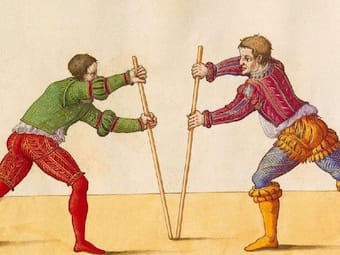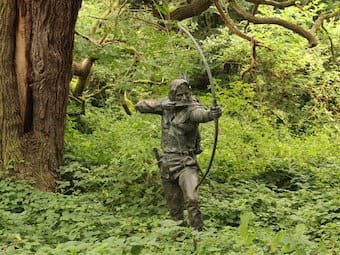Morris dancers perform in front of a statue of legendary outlaw Robin Hood outside Nottingham Castle. This most English of dance traditions dates back at least to the 1440s, when (it is said) Edward III entertained Moorish (hence ‘morris’) dancers at court. A century later, morris dancers were a firm favourite, and woven together with the legend of Robin Hood. Parish accounts at St Helen’s in Abingdon, Oxford, record that in 1560 twenty-four morris bells were purchased for a shilling, and six years later eighteen pence went on “setting up Robin Hoodes bower”. Attempts to stamp morris dancing out during the miserable Interregnum (1649-1660) did not wholly succeed, though May Day pageantry never regained the popularity of Henry’s time.
WHEREUNTO the king granting, Robin Hood whistled and all the two hundred archers shot off, loosing all at once; and when he whistled again they likewise shot again; their arrows whistled by craft of the head, so that the noise was strange and loud, which greatly delighted the king, queen, and their company. Moreover, this Robin Hood desired the king and queen with their retinue, to enter the green wood, where, in harbours made of boughs, and decked with flowers, they were set and served plentifully with venison and wine by Robin Hood and his men, to their great contentment, and had other pageants and pastimes.
I find also, that in the month of May, the citizens of London of all estates, lightly in every parish, or sometimes two or three parishes joining together, had their several mayings, and did fetch in May-poles, with divers warlike shows, with good archers, morris dancers, and other devices, for pastime all the day long; and toward the evening they had stage plays, and bonfires in the streets.
Questions for Critics
1. What is the author aiming to achieve in writing this?
2. Note any words, devices or turns of phrase that strike you. How do they help the author communicate his ideas more effectively?
3. What impression does this passage make on you? How might you put that impression into words?
Based on The English Critic (1939) by NL Clay, drawing on The New Criticism: A Lecture Delivered at Columbia University, March 9, 1910, by J. E. Spingarn, Professor of Comparative Literature in Columbia University, USA.
Précis
King and Queen were much impressed by the skill of Robin’s archers, and still more when they were prevailed upon to enter the greenwood for a right royal feast. Stow added that in those days, May Day celebrations often went on late, and included mock battles, stage plays, and street parties around a bonfire. (54 / 60 words)
King and Queen were much impressed by the skill of Robin’s archers, and still more when they were prevailed upon to enter the greenwood for a right royal feast. Stow added that in those days, May Day celebrations often went on late, and included mock battles, stage plays, and street parties around a bonfire.
Variations: 1.increase the length of this precis to exactly 60 words. 2.reduce the length of this precis to exactly 50 words. 3.introduce one of the following words into the precis: because, if, just, may, or, ought, whether, who.
Archive
Word Games
Jigsaws Based on this passage
Express the ideas below in a single sentence, using different words as much as possible. Do not be satisfied with the first answer you think of; think of several, and choose the best.
Spinners Find in Think and Speak
For each group of words, compose a sentence that uses all three. You can use any form of the word: for example, cat → cats, go → went, or quick → quickly, though neigh → neighbour is stretching it a bit.
This exercise uses words found in the accompanying passage.
1 One. Robin. Serve.
2 Call. Loose. Venison.
3 Even. Noise. Pageant.
Variations: 1. include direct and indirect speech 2. include one or more of these words: although, because, despite, either/or, if, unless, until, when, whether, which, who 3. use negatives (not, isn’t, neither/nor, never, nobody etc.)
Prepositions Find in Think and Speak
Each of the words below may be followed by one or more prepositions. Compose your own sentences to show which they might be. Some prepositions are given underneath.
This exercise uses words found in the accompanying passage.
1. Except. 2. Walk. 3. Enter.
Selected Prepositions
About. Against. Among. At. By. For. From. In. Into. Of. On. Out. Over. Through. To. Towards. Upon. With.
Add Vowels Find in Think and Speak
Make words by adding vowels to each group of consonants below. You may add as many vowels as you like before, between or after the consonants, but you may not add any consonants or change the order of those you have been given. See if you can beat our target of common words.
strts (6)
austerities. saturates. starts. straits. streets. struts.
Post Box : Ask Nicholas
Grok : Ask Grok
You are welcome to share your creativity with me, or ask for help with any of the exercises on Clay Lane. Write to me at this address:
See more at Post Box.
If you like what I’m doing here on Clay Lane, from time to time you could buy me a coffee.
Buy Me a Coffee is a crowdfunding website, used by over a million people. It is designed to help content creators like me make a living from their work. ‘Buy Me a Coffee’ prides itself on its security, and there is no need to register.
Related Posts
It was George-a-Green’s job to stop animals trampling the crops, and it nettled his pride in Wakefield’s broad acres to see some ramblers behaving no better.
Picture: Paulus Hector Mair (1517-1579). Source.
Posted August 2 2021
It was a bitter moment for Anne Boleyn when she saw that what she herself had done to poor Catherine of Aragon, Jane Seymour was about to do to her.
Picture: By Hans Holbein the Younger (1497/1498–1543), Wikimedia Commons. Licence: Public domain.. Source.
Posted June 21 2021
In the days of Henry VIII, eminent Scottish historian John Major looked back to the reign of Richard the Lionheart and sketched the character of legendary outlaw Robin Hood.
Picture: © Richard Croft, Geograph. Licence: CC BY-SA 2.0.. Source.
Posted January 18 2021






